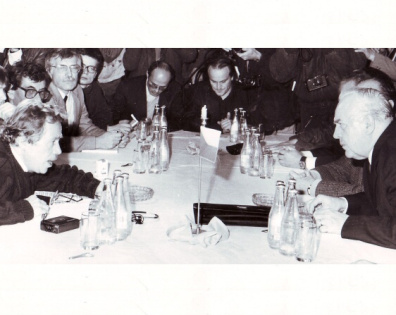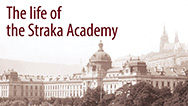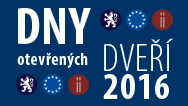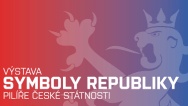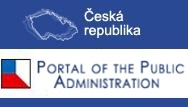Important days
14. 12. 2009
Government of National Understanding (December 1989 - June 1990)
These formal acts concluded the first stage of the "velvet revolution" in which the Communist Party of Czechoslovakia lost its hegemonic position laid down in the Constitution. It resulted in the composition of the new government in which communists lost their majority. A dramatic plot preceded this event. One week ago, on 3 December, a new reconstructed government of the communist Prime Minister Ladislav Adamec had been presented to the public. Fifteen out of twenty ministerial chairs gained members of the Communist Party of Czechoslovakia. Thus, the Czechoslovak public found a weighty reason for starting a new wave of brisk but peaceful protests against that government with communist majority. However, manifesting citizens did not request an immediate departure of communists from the politics; they just refused communists´ majority in the government and other institutions. Just because of this aspect the new cabinet headed by a communist Marian Čalfa was called the Government of National Understanding. This title expressed the fact that the entire nation understood the compromise political agreement and adopted it as a way out from the crisis. From the sober point of view, the government should have been called a government of a historical compromise, but in revolutionary times more poetic titles are often used.
Ten government seats out of twenty-one remained to members of the Communist Party of Czechoslovakia, two seats gained members of the People's Party, two seats the Socialist Party and seven seats remained to ministers without a political affiliation. While the formula "15:5" was strictly refused by the public, the formula "10:11" was acclaimed. Both numerical rates show well limits of the "velvet revolution". However, the party rate was just a temporary and formal indicator because soon after the government's appointment the Prime Minister Marián Čalfa, the First Deputy Prime Minister Valtr Komárek and the Head of the State Planning Commission left the Communist Party of Czechoslovakia and the political party proportion was markedly changed to the disadvantage of the Communist Party. The government enjoyed nearly limitless support of the public which regard the government rather as a group of experts who would lead the country out of the political crisis and economic stagnation. Trust of people in experts, in an apolitical administration of the country obscured for a certain time the political party principles. Nevertheless, one year later the principle returned with extreme power. The attitudes and opinions change very quickly in revolutionary times. Democratic movements Civic Forum and the Public against Violence did not gain majority of chairs in the Čalfa´s cabinet; nevertheless their ministers gained majority of the important ministries and their ministers belonged among the most popular personalities of that time: a dissident journalist Jiří Dienstbier as the Minister of Foreign Affairs, blue-collar leader Petr Miller as the Minister of Labour and Social Affairs, a "grey zone" liberal economist Václav Klaus as the Minister of Finance, a tribune of the velvet revolution Valtr Komárek as the Deputy Prime Minister for the Economic Reform, catholic activist Ján Čarnogurský as the Deputy Prime Minister. The other minister remained more or less in their shadow.
The federal government and the Federal Assembly, in which communist waived their right to majority in the end of 1990, started fast liberalization and democratization of the political, social and economic life. So-called "Small Act on Political Parties" was adopted on 23 January 1990 which enabled establishing a new pluralist political system. The traditional political parties of the pre-November National Front were given an advantage and became a part of the democratic politics, including the Communist Party of Czechoslovakia. Only political movements – the Civic Forum and the Public against Violence contributed new elements into the politics. Apart from these parliamentary formation numerous small political parties were established with the ambition to be successful in the co-options in January and February and mainly in general elections that were to be held in June and November. The new Act on Elections adopted on 27 February stipulated that there would be the proportional system used in the election, that elections would be held in 12 election districts and that the 5% limit for political parties would be used (3% in case of the election to the Slovak National Council). A two-year election period was proposed and the main task of politicians was to adopt the new Constitution, and to reform economics.
The important laws anchoring civic freedoms – the Act on Association of Citizens, the Act on the Right to Assembly, the Act on Petitions and the amendment to the Press Act – the Parliament adopted, in compliance with the proposals of the federal government, on 27-29 March 1990. Principal condition for the upcoming changes in the economic sphere were to be supported by acts on equalization of all forms of property ownership, on joint-stock companies, on business activities of natural persons, on state-owned companies adopted in the second half of April. On the basis of the impulses of the President and government the death penalty was abolished and the amendment to the Act on the system of Elementary and Secondary Schools was adopted together with the Act on Universities which granted universities freedom and autonomy.
Also changes in the foreign policy orientation were very dynamic and indicated that Czechoslovakia was striving for returning to Europe. This tendency was symbolically highlighted by two extraordinary visits. The 14th Dalai Lama of Tibet, a Nobel Prize winner, arrived on 2 February, and the Pope John Paul II visited on 21-22 April Bohemia, Moravia and Slovakia. The agreement of the departure of Soviet troops between Czechoslovakia and the Soviet Union was concluded on 26 February in Moscow and the last Soviet soldier left the country on 27 June 1991. The foreign policy of the Czechoslovak Federal Republic represented by the minister Jiří Dienstbier and President Havel was based on the presumption that both military blocks – the NATO and the Warsaw Pact – would gradually perish and would be replaced by the system of collective security in the framework of the Organization for Security and Cooperation in Europe. The Confederation of European States was to be established in Europe as a lowest stage of the United States of Europe. Jiří Dienstbier presented this ambitious plan at the Royal Institute of International Affairs in London on 3 April. Gradual dissolution of the Soviet military pact was agreed at the session of member states of the Warsaw Pact in Moscow on 6 June. Czechoslovakia declared its interest in cooperation with West-European institutions and the Council of Europe granted Czechoslovakia the status of a special guest on 7 May.
Simultaneously with the fast liberalization and democratization efforts, the first crisis symptoms became to appear in the transition to democracy. The public was a witness of violent disputes over the concept of managing the Ministry of Interior, over the best scenario of the economic reform, over the name of the common state of Czechs and Slovaks and, last but not least, over putting the Communist party of Czechoslovakia out of the law. The atmosphere of "the national understanding" faded away in the first moths of the following year. Starting from January 1990, in the connection with the first spontaneous and sometime rather violent lustration processes, several ministers had to leave the government as there was suspicion that they collaborated with the State Security Service. The procedure was mostly quiet in order to preserve the reputation of uncorrupted experts.
The problem of the State Security Service was affecting violently the political scene throughout the entire transition period. The Ministry of Interior was immediately in the thick of things of several group and ministers of Civic Forum and the Public against Violence did not have any influence on the processes at the ministry. The new Minister of Interior Richard Sacher was fully supported by President Havel and the Coordination Centre of the Civic Forum in the beginning. However after it was proved that his concept of personnel continuity absolutely differs from the concept of the Civic Forum that was based on immediate departure of all members of the State Security Service a violent and strong dispute broke out. The principal motive of hidden activities at the Ministry of Interior was to acquire the power capital connected with the ministry's archives.
Also the issue of the economic transformation became a subject of strong polemics. The concept of peaceful and exclusively professional remedy of economic matters which had been deformed by central planning system went to rack and ruins. Economics became an explosive political issue. Based on the stimulus of the Civic Forum the informal competition on the "best scenario of the economic reform" started in which various groups tried to win. It is natural that the most influential became eventually concepts of three governments of national understanding – federal, Czech and Slovak. The proposal of the economic reform prepared by the team of experts of the Czech Government headed by Pithart was in compliance in certain aspects of the concept of economic experts headed by the Minister of Finance Václav Klaus. However there was rival animus between the Czech and the federal team, and that animus hampered any productive cooperation. The Slovak opinion on the economic reform was creating simultaneously and independently on Czech or federal concepts. This fact adumbrated a departure of Slovak national interests from the common state. Representatives of the Civic Forum and the Public against Violence noticed marked absence of linkage between Czech and Slovak visions as late as before election and that was too late to start an effective and fruitful cooperation.
Despite further problems and complications (in particular in connection with disputes over putting the Communist Party out of the law and measures against local communist officials and "communist mafias") the government enjoyed considerable popularity. People projected their wishes and expectations into the most significant politicians. The President Václav Havel personified "different politics" – opening tabooed topics in an inventive and non-bureaucratically way, politics inspired with moral appeals. The Minister of Foreign Affairs was connected with a new and west-oriented foreign policy of Czechoslovakia. The Minister of Finance Václav Klaus became as early as in the transition period a representative of fast and promising economic reform. In Slovakia the Prime Minister Milan Čič and the Chairman of the Slovak National Council Rudolf Schuster belonged among the most popular politicians. Surprisingly their connection with the pre-November communist establishment did not hamper that. Undoubtedly it was caused by the fact that they managed to persuade the public, through their skilful speeches and gestures, that they were able to protect Slovak interests.
After free elections in June 1990 the top politician of the government of national understanding made their marks in the new appointed federal government. In fact, its members were all those who had win unprecedented popularity since December 1989: Jiří Dienstbier, Václav Klaus, Petr Miller, Vladimír Dlouhý and Marán Čalfa. The new government was called, rather pathetically again, "the government of national sacrifice".
